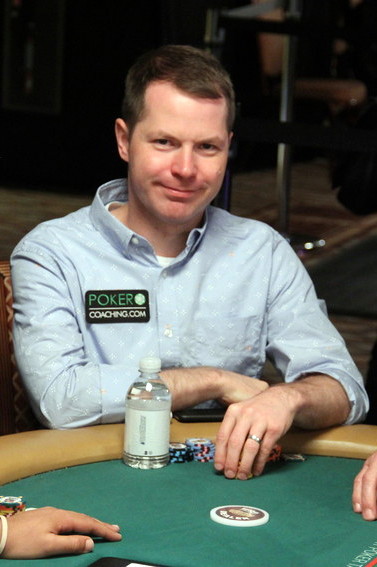






Playing Out Of Position With A Marginal Made Handby Jonathan Little | Published: Apr 21, 2021 |
|
|

A common mistake many players make is to overvalue their decently strong, but non-premium hands.
In a $1,500 buy-in tournament, everyone folded to a loose, splashy player on the button who raised to 300 at 50-100 blinds out of his 30,000 stack. I called from the big blind with 10 7
7 . While my call may seem a bit loose, 10-7 is certainly playable as long as I play well post-flop.
. While my call may seem a bit loose, 10-7 is certainly playable as long as I play well post-flop.
The flop came A 10
10 3
3 , giving me middle pair. I checked, and my opponent bet 300 into the 650 pot. I called.
, giving me middle pair. I checked, and my opponent bet 300 into the 650 pot. I called.
Some especially weak players may think I should fold immediately on the flop because I am often behind to an ace, but it is important to realize that even when I am behind, I will improve to two pair or trips on the turn from time to time. Also, I have no reason to think my opponent so tight and straightforward to the point that he will only bet hands better than mine. Pretty much everyone will bet a hand like flush draws on this flop, and many players will bet with their entire range, putting my middle pair in decent shape.
The turn was the 7 , giving me two pair while also completing the flush draw. I checked, my opponent bet 1,100 into the 1,250 pot, and I called.
, giving me two pair while also completing the flush draw. I checked, my opponent bet 1,100 into the 1,250 pot, and I called.
When my opponent bets large, he is essentially saying that he has a polarized range, meaning he either has a premium made hand (most of which I lose to) or a draw (which I may or may not have a lot of equity against, depending on how strong it is).
This is a classic “way ahead or way behind” scenario. In this case, raising does not make sense because I will only get called by better made hands that crush me and strong straight flush draws that are getting the right price to call.
The river was the 5 . I checked and my opponent checked behind.
. I checked and my opponent checked behind.
If my opponent bet the river, I would have reluctantly called. Against loose, splashy opponents, it is important to realize that they frequently get to the river with many missed draws and generally junky holdings. While they will have more random flushes like 9 3
3 in their range than the normal player, they also have more busted flush draws like Q
in their range than the normal player, they also have more busted flush draws like Q 9
9 . For the most part, you should call these players’ river bets with bluff catchers more often than normal unless they prove that they only bet the river with the nuts.
. For the most part, you should call these players’ river bets with bluff catchers more often than normal unless they prove that they only bet the river with the nuts.
I turned my hand face-up and my opponent quickly mucked. He most likely had an ace that went for thin value on the turn (also a marginal made hand) and opted to see a cheap showdown. As long as his ace had a high kicker, I don’t mind his play. If it had a weak kicker though, he should have checked, looking to see a cheap showdown. ♠
 Jonathan Little is a two-time WPT champion with more than $7 million in live tournament earnings, best-selling author of 15 educational poker books, and 2019 GPI Poker Personality of the Year. If you want to increase your poker skills and learn to crush the games, check out his training site at PokerCoaching.com/cardplayer.
Jonathan Little is a two-time WPT champion with more than $7 million in live tournament earnings, best-selling author of 15 educational poker books, and 2019 GPI Poker Personality of the Year. If you want to increase your poker skills and learn to crush the games, check out his training site at PokerCoaching.com/cardplayer.
Features
The Inside Straight
Strategies & Analysis